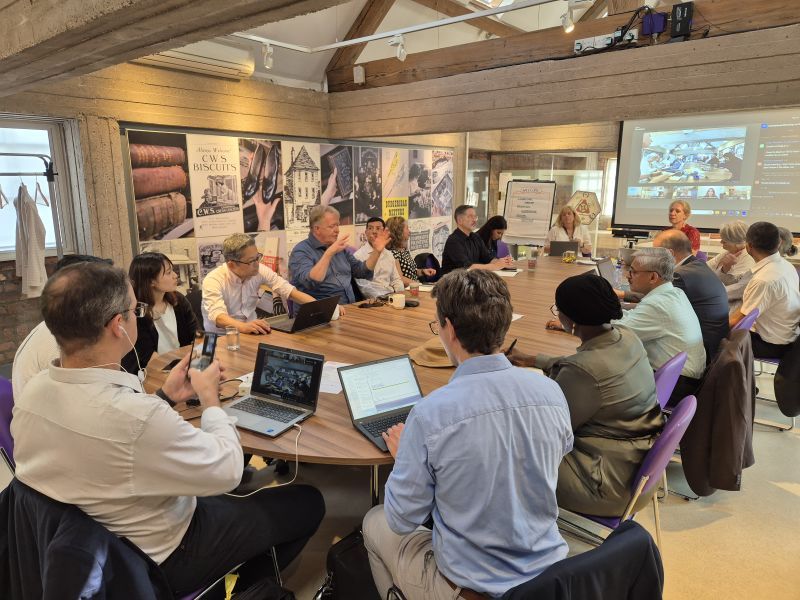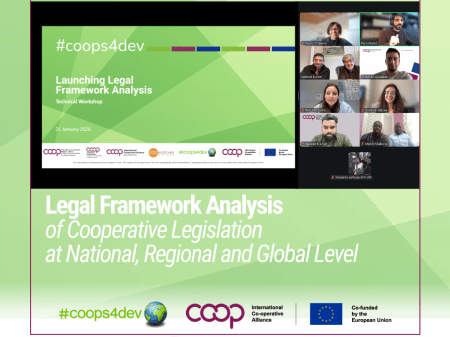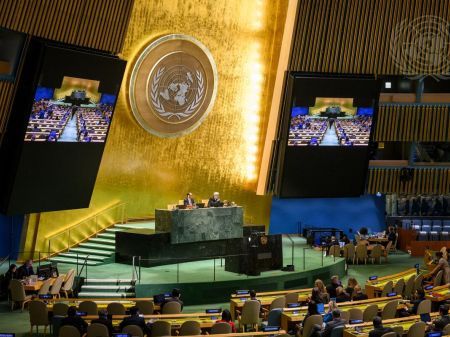
The International Cooperative Alliance (ICA) Working Group on Cooperative Cultural Heritage met in person in Rochdale for the first time on 30 June. Ahead of the meeting, 19 cooperators joined a tour of Rochdale’s main heritage sites including the Rochdale Townhall and the Rochdale Exchange (Pioneer’s Market), which honours the cooperative Pioneers, including Eliza Brierley, the first woman member of the Rochdale Society of Equitable Pioneers (the Store).
Representatives from 12 countries attended the meeting, during which they worked on developing a first version of international standards of cooperative heritage. These standards will be used to select 25 cooperative heritage sites which will be added, as a first list, to a digital world map being produced by the ICA with the support of National Cooperative Development Corporation of India. The launch of this map, along with a call for nominations for cooperative cultural heritage sites and elements, is expected during the next in person meeting of the ICA Global Board in November this year in Brazil.
DotCoop, the Registry of the .coop domain name and the custodian of the world map of cooperatives will offer guidance and support in this process.
“This Working Group is at the heart of the strategy we want to build,” ICA Director General, Jeroen Douglas, said at the meeting.
ICA Director of Legislation, Santosh Kumar, also offered an overview of the criteria used by the United Nations Educational, Scientific and Cultural Organization (UNESCO) in the selection of World Heritage Sites. He explained these sites can be either tangible and include physical, material sites, like buildings, monuments, and landscapes, or intangible, which encompass non-physical aspects of culture like traditions, knowledge, and skills.
UNESCO recognised the idea of organising in co-ops as intangible cultural heritage in 2016. Specific cooperative practices such as the World Heritage property Røros Mining Town and the Circumference in Norway have also been recognised for preserving traditional farming through cooperative systems.
Other existing UNESCO entries include women divers in Jeju Island, in Korea, who sell their catch via cooperatives, and women’s Argan oil cooperatives in Morocco.
During the meeting, participants discussed the importance of engaging young people, educational institutions and raising awareness of cooperative heritage, exchanging knowledge and experience through practice, promoting cooperative education and intergenerational connections, securing funding, aligning platforms and standards and, increasing visibility and recognition and finding new ways of communicating.
The meeting included a presentation by Gerard and Beatrice Barras from Coop Ardelaine in France. Set up 42 years ago in an old wool spinning mill, the worker cooperative runs practical workshops through which it passes on the local know-how and culture.
The cooperative, which welcomes 15,000 visitors each year, was part of Coop Route, a Cecop-Cicopa Europe project funded by the European Commission, which identified 80 cooperative tourist destinations.
Using the destinations identified via the route, Coop Ardelaine has been running trips to neighbouring countries.
“The idea is to learn from other’s experiences, train our cooperators, broaden our vision and get inspired,” explained Ms Barras.
In 2022 UNESCO organised its second global conference on cultural policy and sustainable development, Mondiacult, to act for culture as a global public good. The ICA used the opportunity to host a side event. With another Mondiacult conference due to take place in 2025 in Barcelona, Spain, the ICA will be seeking to participate in the main event as well as run an official side event and position in its discourse, the cooperative enterprise type as the logical and natural means to achieving sustainable development.




